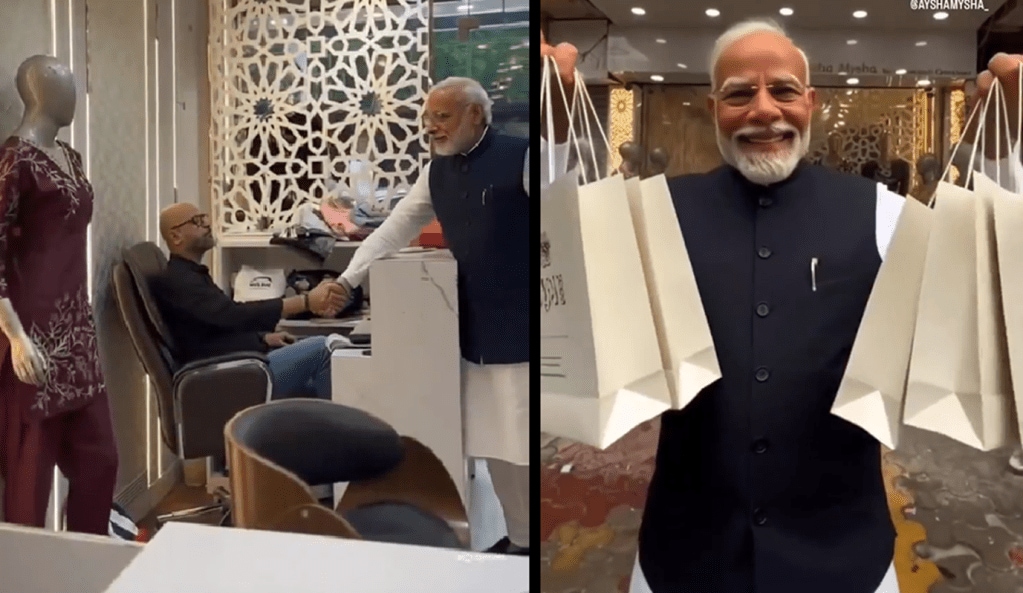A video of ‘Prime Minister Narendra Modi‘ shopping for women’s apparel in Delhi ahead of the festive season has left the internet stunned. The AI-generated deepfake video also includes a voiceover of ‘Modi’ endorsing the brand and urging the people of India to make a purchase. Social media users appeared to be deeply divided by the bizarre clip — with some amused and others absolutely horrified. The video has also sparked deeper conversation about the dangers of deepfake footage and the legality of such creations.
“Bhaiyo aur behno. If you want premium quality ladies’ suits at wholesale prices…come to Aysha Mysha in Lajpat Nagar. New designs are launched every week — that are not found anywhere else in the market,” the ‘Modi’ voiceover can be heard claiming.
The now-viral footage shows the ‘Prime Minister’ walking into the frame and entering the store before shaking hands with the attendant. He is then shown a variety of ethnic salwar suits and eventually walks out of the store with half a dozen bags — seemingly ecstatic about the purchases.
‘Pure science fiction’
“Creativity at its peak,” joked one X user.
“In the name of freedom of speech and expression you can do anything,” countered another.
“I don’t think there’s any law against AI video generation for promotion till yet,” reminded a third.
Many on social media appeared convinced that technology had gone a tad too far while others stressed the need for clear tagging in case of AI-generated content. Current laws in India do not explicitly ban such content — focusing primarily on guidelines and advisories to ensure transparency and ethical use.
“First it was fake calls. Now it’s fake shopping sprees. Next up: AI will show leaders living the aam aadmi reality. Pure science fiction,” lamented another comment
“Every AI-generated content should have a watermark indicating that it’s AI-generated,” insisted a fourth.
AI laws in India?
Deepfakes have become a growing problem across the world — with sophisticated technology making it increasingly harder to distinguish from reality. Prime Minister Narendra Modi had also voiced concern towards the end of 2023 when a video of him doing garba went viral across the country. AI-generated fakes are not specifically illegal but remain punishable under misinformation, defamation, or identity misuse laws.
“I recently saw a video in which I was seen playing Garba. I have not done Garba since school…There are many other such videos online. During the times of Artificial Intelligence, it is important that technology should be used responsibly,” Modi had urged during a 2023 Diwali event in Delhi.
It was later revealed that the clip actually featured businessman Vikas Mahante (a Modi lookalike) dancing at a Navratri event rather than a blatant deepfake. But the situation has only worsened since then — with AI platforms now generating a staggering number of fake images and videos on a daily basis.
The creation and circulation of deepfake videos — such as the now-viral clip of ‘PM Modi’ on a shopping spree — can face legal action for spreading misinformation, defaming Modi or on identity theft grounds. The situation could vary from video to video — but leaves the creators open to various charges.
Section 66C of the IT Act deals with identity theft (such as using identification features unique to the PM) while Section 66D addresses cheating by personation using a computer resource. The video could also be actionable under IPC sections related to defamation (Sections 499 and 500) if it harms the reputation of the PM or spreads misleading information. The Information Technology (Intermediary Guidelines and Digital Media Ethics Code) Rules also make it mandatory for social media platforms to take down such misleading or deceptive content once flagged.

